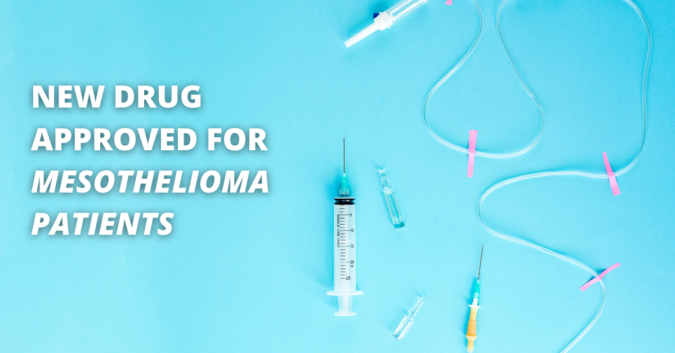On Oct. 2, 2020, a promising first-line drug treatment regimen for unresectable malignant pleural mesothelioma was approved by the U.S. Food and Drug Administration (FDA). Caused by exposure to asbestos fibers, pleural mesothelioma is a fatal cancer that forms in the thin membrane that surrounds and protects the lungs.
The novel drug therapy combines Opdivo® (nivolumab) with Yervoy® (ipilimumab), two intravenous drugs that limit tumor growth by increasing the functionality of a patient’s T-cells.
According to Bristol-Myers Squibb, the manufacturer of both Opdivo and Yervoy, the FDA’s approval arrives 5 months ahead of schedule.
First Treatment for Malignant Pleural Mesothelioma in ‘More Than a Decade’
The FDA approval is welcome news for a mesothelioma community that has not seen a new drug-treatment regimen for malignant pleural mesothelioma approved for 16 years. The combination therapy of nivolumab and ipilimumab is only the second-ever FDA-approved systemic therapy for mesothelioma.
Director of the FDA’s Oncology Center of Excellence, Richard Pazdur, M.D., said:
“Today’s approval of nivolumab plus ipilimumab provides a new treatment that has demonstrated an improvement in overall survival for patients with malignant pleural mesothelioma. In 2004, FDA approved pemetrexed in combination with cisplatin for this indication, and now patients have an important, additional treatment option after more than a decade with only one FDA-approved drug regimen.”
Approximately 3,000 new cases of mesothelioma are diagnosed each year in the United States, and between 75-80% of those are malignant pleural mesothelioma, or between 2,200-2,400 cases. The vast majority of these cases are “unresectable,” meaning the tumor(s) cannot be removed by surgery.
With current treatment for malignant pleural mesothelioma, survival rates are extremely poor. Only 10-12% of patients live more than 5 years after diagnosis. With unresectable cancer, that figure is even lower: Median survival is between 9 to 12 months from diagnosis.
New Drug Therapy Could Increase Patient Survival Rates
In the clinical trials that led to the drug combination’s approval, adult patients with unresectable malignant pleural mesothelioma were treated with nivolumab every two weeks and ipilimumab every six weeks. The treatment continued for up to two years.
Compared to traditional chemotherapy, patients who received the nivolumab-ipilimumab combination therapy survived on average 4 months longer than patients who did not.
In total, malignant pleural mesothelioma patients who received chemotherapy survived an average of 14.1 months. Patients who received the nivolumab-ipilimumab drug therapy survived an average of 18.1 months.
Mesothelioma Patients Need Our Help and Support
Fast on the heels of Mesothelioma Awareness Day, such significant news cannot be understated. The FDA’s approval of the novel therapy may help hundreds — if not thousands — of patients spend a few more precious months with their loved ones.
Still, mesothelioma patients and their families face one of the deadliest — and least understood — cancers on the planet. Preventing asbestos exposure from happening in the first place remains the best and only way to lower the number of people who develop and ultimately die from mesothelioma.
While 70 countries around the world, including Canada, Australia, New Zealand, and the entire European Union, have banned asbestos, the carcinogen is still legal in the United States.
Show your support for mesothelioma patients by joining the push to ban asbestos in the United States, promoting awareness on social media platforms, and offering donations to non-profit organizations that seek a cure for the deadly disease.
All brands are trademarks of their respective companies.
